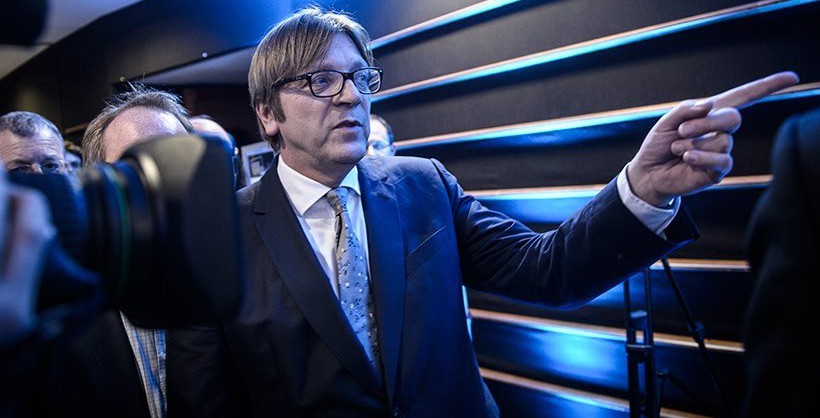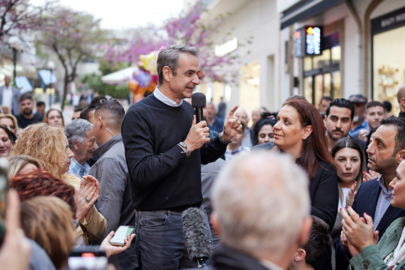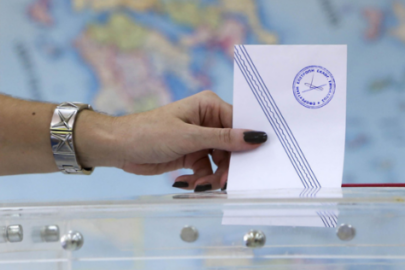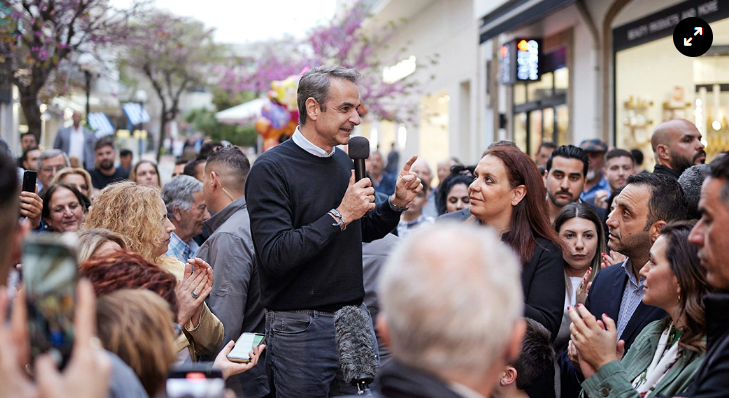Head of the Alliance of Liberals and Democrats (ALDE) group in the European Parliament Guy Verhofstadt spoke with Proto Thema prior to his meeting with Greek Prime Minister Alexis Tsipras on Monday at 1 p.m. The former Belgian prime minister spoke of the challenges that lie before Greece and pointed to the need for real reforms.
In July’s Parliament’s plenary session you asked Alexis Tsipras to show that he is a “real leader and not a false prophet”. You have also asked him to present a roadmap for real reforms. A week later, on July 13th, Mr Tsipras accepted the agreement to the third bailout. What do you think about Mr. Tsipras now? Do you think that he is eager to prove himself as “a real revolutionary reformer”?
I think that Mr Tsipras has shown that he is serious about reforming Greece. He had to make some difficult choices the last months, but has shown that he is able to make compromises and is willing to cooperate with the rest of Europe to make sure that Greece and Europe emerge stronger from this crisis. It is of course a bit early to call him a “revolutionary reformer” now, but I am happy that he has negotiated a deal with the other European countries which enabled Greece to stay in the Eurozone. That is very important for the Greek people and the Eurozone itself. We have to help Greece and the other countries that struggle with economic challenges. On Monday, I will discuss the reforms and the future of the Eurozone with him.
In your plenary speech you have also said that “we were sleepwalking towards a Grexit”. Has this been avoided or there is a possibility to see “Grexit” back in the headlines again in a few months’ time?
The debate in the European Parliament took place on the Wednesday before the crucial Summit in Brussels that weekend. I was very angry that leaders did not take their responsibility to avoid a Grexit. Fortunately, a deal was found the weekend after. I hope that the frank debate in the European Parliament was a wake-up call and has helped the government leaders to understand that we were very close to a Grexit. Now the Greek government must continue to show that it is serious about implementing the required reforms. But not only Greece has homework to do. Also Europe has to change. We need to strengthen the European economic governance by agreeing to set up a real European Economic Government with proper budgetary resources. We should also address the high debts many countries are struggling with. This could be done by implementing a joint debt mutualisation management system. The last years have shown that a monetary union without a political union does not have a future. If we want to save the Eurozone, we have to make a leap forward and work much more closely together.
Mr. Tsipras asked for EU Parliament’s support “to change Greece”, even the direct and full involvement of the Parliament in the regular review process regarding the implementation of the loan agreement. Since the legal framework of the bailout gives the European Parliament no role, what kind of help can you, as directly-elected EU body, provide to Greece?
I agree with Mr. Tsipras that the European Parliament needs to play a role in the monitoring process of the reforms. My Group, the Liberals and Democrats, proposed this and it was unanimously accepted by the other political Groups. Now, we have to find a way to implement this idea. This is also a topic I will discuss with Mr. Tsipras on Monday. Until now, the monitoring process by the Troika was more of an accounting exercise to make sure that the debts were paid back instead of ensuring that structural reforms were implemented to make the Greek economy more competitive again. On top of this, the work of the Troïka has been completely intransparent so far. This will have to change. We have to make the monitoring process more open, more intelligent and more democratic. If the Parliament gets involved, it will provide a platform to monitor and discuss the reforms with the Greek government and, if necessary, adapt the reform plan in a democratic way.
Since April, the 28 heads of state and government of the EU have met four times in Brussels to discuss the refugee crisis. Still the refugees are coming, but in some EU states barriers are rising. What EU should and could do to address the refugee crisis before we see more unilateral action by member states, greater willingness to explore opt-outs and invocation of exceptional circumstances to suspend EU-level action?
This refugee crisis can only be solved if we adopt a holistic approach. This demands political leadership and courage. These have been missing so far. A comprehensive strategy should entail four components: (1) a European Border and Coastguard System, (2) a Single European Asylum System and Migration Policy, (3) a European Blue Card equivalent to the American and Canadian Green Card to address economic migration and (4) a common position on how to end the bloodshed in Syria.
Unfortunately, the government leaders have not found any agreement on any of these four building blocks. Instead of finding a joint approach, the European Union tries to outsource the refugee crisis to Turkey by handing out enlargement promises and financial guarantees. I believe that we should indeed intensify our cooperation with Turkey, but it can only be done in conjunction with a real European effort to tackle this crisis. If we fail to do so, this will the end of the European Union as we know it.
Several euro zone governments have asked for more flexibility on the Stability and Growth Pact to cope with the costs of sheltering and managing refugees. President Juncker in EU Parliament was in favour of a more flexible interpretation of the Pact for member states that do make an extraordinary effort. Is there any chance that Greece’s frontline role in the migrant crisis will change the political calculus for the bailout rules of for a debt relief?
The first thing we need to do is to provide Greece with adequate financial, material and human resources needed to cope with this unprecedented influx of migrants. In a European Union with free borders and a Schengen area, it is of crucial importance that we manage the external border collectively. Greece`s border has become Germany`s border. What has become crystal clear is that national governments alone are not able to deal with this crisis on their own. Instead of building fences and walls within Europe, we should help each other and we certainly have to help Greece.
But this also means that the Greek government should accept European help. What I don’t understand is why Greece does not make full use of the European regional funds that are allocated to Greece. These are issues I will also discuss with Mr. Tsipras on Monday.
Since 2010 there has hardly been a year when the EU has not been on the brink of some crisis: banking, debt, Russia’s annexation of Crimea and now refugees. Is there a possibility that those serial failures can interrupt the step-by-step approach to more integration or it will be the other way round?
In my latest book “Europe`s disease”, I address Europe`s paralysis. It’s clear that Europe`s step by step approach does not work anymore. What we need is a big leap forward. Without taking any risk and making real choices, Europe will slowly become insignificant. From time to time, in all societies, it is necessary to make a big leap forward and take our faith in our own hands. In today’s world order dominated by empires such as China, India, the US and Russia, Europe can only survive if it chooses to make radical choices: A European foreign policy with far-reaching defence cooperation and a single seat in the United Nations, a European Economic Government and a common European Asylum- and Migration system. Last month, when Chancellor Merkel and President Hollande addressed the European Parliament, I urged them to cooperate more closely with the European Parliament to make progress and end the deadlock. This is the only way to avoid a lost decade for Europe.


































